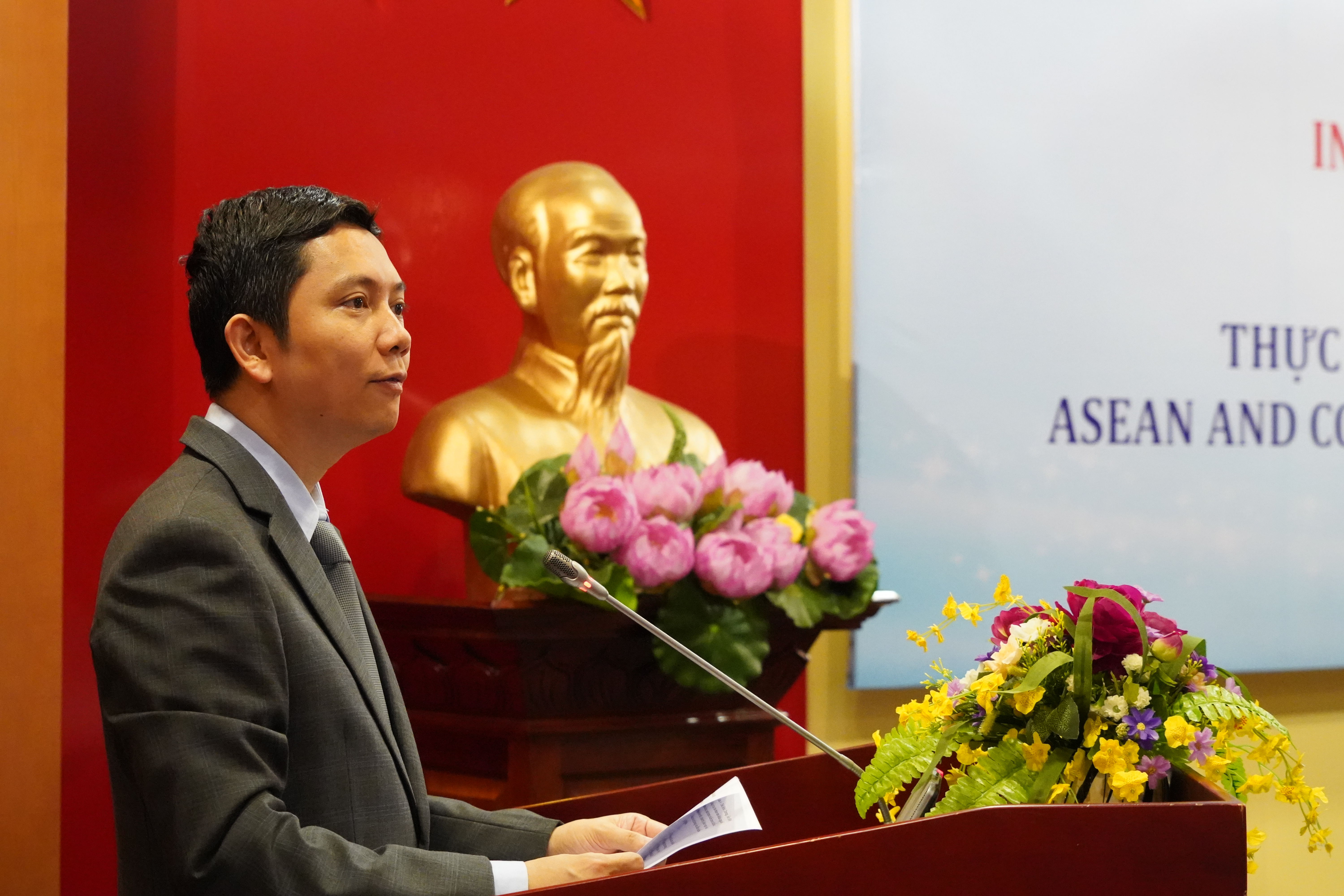 |
|
Assoc.Prof.Dr. Bui Nhat Quang, President of the Academy gave the opening speech at the Workshop
|
Speaking at the opening of the Workshop, the President of VAST warmly welcomed the full attendance of the delegates, emphasizing the role of the Conference in the current post-Covid-19 context and claiming that Covid-19 had swept away. The achievements of nations have accumulated over the years, claiming the lives of hundreds of thousands and threatening the lives of tens of millions of people worldwide. According to the World Bank report on June 8, 2020, the world economy in 2020 will seriously decline, at minus 5.2%, per capita income will decrease by 3.6% and possibly cause 70-100 million people fall into extreme poverty, leading to an increased risk of social unrest. More than 40% of the production and business industries of countries are directly affected by disease blockade measures, which have negative effects on the entire life of the people in general.
Southeast Asia is believed to be the world's first case of Covid-19 infection after China. Since then, the epidemic has left serious implications for the economic development and social stability of ASEAN Community member states. In addition, given the importance of the regional geopolitical, geostrategic and geoeconomic position, Southeast Asia once again becomes the hotspot of competitive influence. Faced with the challenges posed by member countries of the ASEAN Community, the workshop was organized to examine the developments of the region during the Covid-19 period, to assess the impacts caused by Covid-19 on the East. South Asia; research on response solutions of ASEAN member countries in many aspects; at the same time made forecasts about the regional situation in the post Covid-19.
 |
|
Assoc.Prof.Dr. Nguyen Huy Hoang, Director of the Institute of Southeast Asian Studies speaking at the Workshop
|
Addressing the seminar topic, Assoc.Prof.Dr. Nguyen Huy Hoang shared: We are living in the days called "new normal" when all activities have changed due to Covid-19; witnessed the negative impacts from Covid-19 to all aspects of life from the economy, security, politics in the region and the world. The Global Department has strongly changed directions in an unpredictable direction. Competition among major countries is becoming more and more fierce, which requires a scientific and systematic analysis and explanation from leading research experts. Therefore, the seminar taking place will be the necessary scientific forum for domestic and international scientists to discuss current current affairs, as the basis for theoretical and policy implications for countries in Southeast Asia in particular and ASEAN in general.
At the seminar, delegates focused on issues such as the evolution and the current situation of the pandemic in Southeast Asia; its impact and responses by states and ASEAN; changes in regional political security and regional forecasts in the post-Covid era 19 ...
 |
|
Delegates take souvenir photos at the Workshop
|
According to TS. Vo Xuan Vinh, Deputy Director of the Institute of Southeast Asian Studies: Covid-19 has had a direct impact on Southeast Asia since the beginning of 2020 with increasing cases of positive for this virus; Many social isolation orders have been issued, economic and social households in all countries fell into stagnation, even fell into negative growth since Q1/2020 and declined in Q2/2020. Facing such difficulties, all countries in the region have had specific policies with the expectation of minimizing the impact of this epidemic on the socio-economic situation in the country. In terms of specific policies, all Southeast Asian countries apart from social stretching and easing/canceling social exclusion orders have added fiscal, monetary and macro-fiscal policies. to respond. Eight out of 11 countries have proposed solutions for exchange rates and balance of payments; a number of financial support packages have been deployed to improve testing and treatment capacity of Covid-19; Financial packages aimed at increasing social assistance for low-income households are implemented. There are also tax and spending interventions, and financial packages aimed at pumping capital for businesses are also implemented.
Contributing to the opinion papers, many scientists said that ASEAN Community members with the highest political commitment, a comprehensive and comprehensive approach at the national and regional levels, has demonstrated the solid spirit of a united and cohesive ASEAN, the responsibility to overcome the pandemic together, in which Vietnam is recognized by the world as a model of success in fighting against Covid-19 and ASEAN is also given the The disease situation has been controlled, with a high rate of cured patients over the total number of infections, and a low and rapidly declining mortality rate. On the other hand, the ASEAN economies have basically remained stable with the economic decline much lower than the world average and the prospect of post-pandemic recovery. However, with complicated developments, the future of the economies after Covid-19 is still an unpredictable subject, which requires joint efforts, not only at the government level in each country but also at the consensus and joint strength of the entire people in order to step by step adapt and respond to changes happening in all areas of social life.
 |
|
Workshop overview
|
Participating online, scientists from the Royal Academy of Cambodia; University of the Philippines; Singapre; India all said that countries should strengthen their capacity to cope with Covid-19 such as enhancing information sharing and practical experience among ASEAN member countries; promote IT application; enhance the role and importance of network security; strengthening citizen protection; promote economic recovery with specific support policy packages on capital, taxes, goods clearance and commodity supply chains; promoting domestic and foreign investment and strongly implementing policies and regimes for protecting workers and reducing poverty in remote and in needy areas in order to achieve a balanced and sustainable development. to achieve sustainable development goals (SDGs) in the short, medium and long term./.
Pham Vinh Ha







